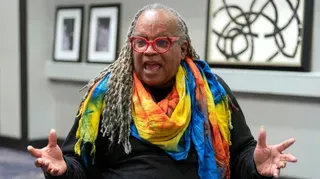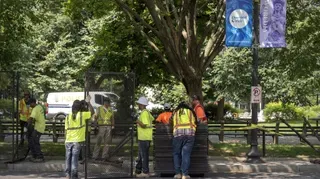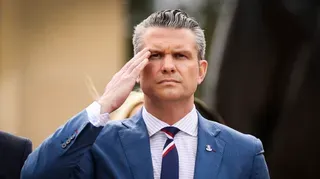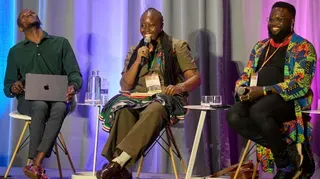March 3, 2012
'Bag-A-Fag' Tactics Not Acceptable, Lawyers Say
Kevin Mark Kline READ TIME: 5 MIN.
Responses have been mixed to SFGN's yearlong investigation into a five-year undercover operation targeting gay men in public parks by the Palm Beach County Sheriff's Office. Purportedly the men were there to have sex. But during the SFGN investigation it was discovered that only four of the 320 arrests examined by the paper actually involved two men having sex. The rest involved an undercover police officer soliciting an otherwise innocent man for sex in a park. As soon as the man took the bait and exposed himself he was arrested.
Some readers were outraged at the PBSO behavior. But others were dismissive of it and responded with something like "well the gay men shouldn't be looking for sex in parks."
"I understand that a lot of people's first thought is 'well they shouldn't be there in the first place looking for sex,'" said attorney Norm Kent. "But the problem is, you don't prosecute people for what they think or might do -- only what they have done."
Kent went on to explain, "If the police are allowed to be overreaching and overbearing and arrest gay men in public parks for being in a lawful place at a lawful time then the next step will be the police officers pulling you over because they don't like the length of your hair, or the color of your car, or the neighborhood that you're driving in. Can you imagine if the police were allowed to do that simply because they think you might do something at that hour, or in that vehicle, or because of the length of your hair?"
Kent, along with other prominent attorneys, believe the LGBT community should be concerned with this behavior from any law enforcement agency that uses what is known as "Bag-a-Fag" tactics to arrest gay men.
"They approach, lure and entice guys who are sitting alone in their car, start a sexually charged conversation and then look for a way to arrest them," said Fort Lauderdale attorney Russell Cormican. "By going out and creating the crime, they're not fighting the problem. They're creating the entire incident from the beginning to end themselves. It's an artificially created act. If that police officer was not there that day, the illegal acts wouldn't have occurred."
Kent added: "Criminal law is designed to interdict acts which have occurred or which are criminal.
It's not created so that officers can sit and speculate who might be the bad."
Kent and Cormican are law partners and have defended upwards of 100 gay men for public sex.
Fighting the "problem" is usually a law enforcement agency's defense, as is the case with the PBSO. Even though SFGN requested a phone, or in person interview, with Palm Beach County Sheriff Ric Bradshaw he only sent a short response that included:
In 2005, PBC Parks & Recreation contacted PBSO requesting assistance with illegal sexual activity occurring in PBC park bathrooms and nature trails. PBSO began to enforce ALL illegal sexual activity in public bathrooms, which were mainly located next to playground areas. This enforcement resulted in numerous arrests over the last few years. The individuals arrested were issued a "notice to appear" in court for the charge of Exposure of Sexual Organs [sic]. (see side bar for full response)
Rudy Serra of Michigan, a lawyer, former judge, and expert involving entrapment of gay men in Michigan, took issue with Bradshaw's response:
"The statement by the Sheriff's Department includes an indication of the very sort of anti-gay hysteria that often infuses these operations," Serra said. "Even in the shortest of statements they are careful to mention 'playgrounds.' In other words, the sheriff believes that gay men are a threat to children. Their statement exploits the most obnoxious, obsolete, and offensive anti-gay stereotype available."
Serra actually authored a report in 2000 called 'Bag a Fag' Operations in Michigan: Police Misconduct, Entrapment and Crimes Against Gay Men. He currently has two cases involving entrapment pending in federal court.
Serra noted that in his 28 years of practicing law he's never seen one legitimate complaint from a citizen concerned about gay sex. He also pointed out that if "there was so much public sex happening then why do officers have to go undercover to catch the men?"
"It's common sense that if it's happening in public you don't need to go undercover to find it," he said.
Cormican pointed out the hypocrisy as well noting that while it's quite common for male police officers to set up a sting like this, the opposite isn't true.
"I've never ever seen an operation where police utilized a female officer to come on to men," Cormican said. "If you took an attractive female officer and put her by the restroom in a city park and she walked up to guys as they went in and out and asked them to show their private parts, I think they would arrest a lot of guys."
Another high profile attorney, Jeffrey Weiner of Miami-Dade County, said he couldn't comment about Palm Beach County, but regardless, he's seen other police departments in South Florida routinely zero in on gay men.
"Many departments unfortunately repeatedly target gay men. It's disgusting and terrible. Miami Beach is one of the worst in that regard," he said. "The bottom line is often and usually we are able to get the cases dismissed. But it's terrible what they put people through. The means they use are really offensive -- the games they play. It's a real problem all over but especially in South Florida. As a lawyer I'm offended by this behavior by the police."
Weiner continued: "One of the reasons they give is that they need to protect the public parks and bathrooms. They like to give the impression that gay men are lurking there to molest underage people. I don't know of any case where that has happened."
Besides anti-bias Serra offers up another theory on why these undercover operations take place.
"There's absolutely a financial incentive," he said. "When they do these operations they do it because they make tons of money. The City of Pontiac in Michigan made over $400,000 seizing cars from sex criminals."
Serra noted that this type of arrest can destroy a person's life and tarnish their reputation, and that's yet another reason the LGBT should take notice.
"It's a big deal being charged. In some cases you could be put on a sex offender registration for the rest of your life," he said. "You can lose your job. It can cost thousands of dollars to hire a lawyer. [Law enforcement] totally banks on the fact that the public is not going to be sympathetic especially when the police say 'we're protecting your children.' We are not a threat to children. But here is a really important point the gay community needs to hear: 'Just because the police say people are having sex in public they shouldn't just accept that as true.'"







